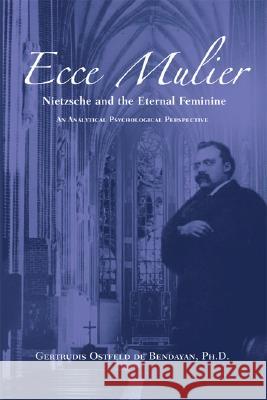Ecce Mulier: Nietzsche and the Eternal Femininean Analytical Psychological Perspective » książka
Ecce Mulier: Nietzsche and the Eternal Femininean Analytical Psychological Perspective
ISBN-13: 9781888602432 / Angielski / Miękka / 2013 / 330 str.
Creativity and madness, sparked by the intrusion of unconscious symbolism, arised from the same feminine depths--what Jung, following Goethe, called the realm of the Mothers. Which one triumphs depends on the strength of the ego under the onslaught of unconscious contents. In this book the author charts the developmental course of that ego, and its archetypal aspects. She has written a pyschobiography that ventures into the realm of the Mothers, so that the creativity and madness of Friedrich Nietzsche can be better understood.
Ecce Mulier begins with a presentation of the existential factors and movements of Nietzsche's soul during his early life. The author discusses his childhood, adolescence, and early adult years--represented by his natal home, early childhood, boarding school, studies in Bonn and Leipzig, practice in Basel, and fundamental and pivotal interpersonal relationships. She focuses particularly on the subjective life of that period, represented by Nietzsche's early poems, reflections in his first autobiographical works, personal letters and initial writings, as well as the symbols of his dreams and hallucinations as reported by Nietzsche himself. Dr. Ostfeld de Bendayan continues with Nietzsche's phase as a solitary wanderer, marked by the crucial breakup with Wagner and giving up of his professorship in Basel at the end of the 1870s. Here, she reveals the "human, all too human" man in his relationship with the feminine, using his experiences during continuous journeys and his psychological approach to the imagery found in Nietzsche's most significant creative works. Finally, the author offers evidence of the enactment of the Dionysus and Ariadne myth and the way Nietzsche is consumed eventually by living his own myth unconsciously: "In such instances, the personal domain of choice and conscious differentiation has been lost, thus producing a life lived out on an archetypal and not human level. In a fascinating yet often tragic way, the fate of individuals caught in such transpersonal coupling often parallel the eternal dramas described by myths of these archetypal figures." (Michael Conforti, Field, Form, and Fate) By tracing the manifestations of this myth throughout Nietzsche's life and work, Dr. Ostfeld de Bendayan offers an unique look at one of the most important thinkers of modern Western philosophy and a valuable addition to Jungian literature.Creativity and madness, sparked by the intrusion of unconscious symbolism, arise from the same feminine depths—what Jung, following Goethe, called the realm of the Mothers. Which one triumphs depends on the strength of the ego under the onslaught of unconscious contents. The developmental course of that ego, and its archetypal aspects, are charted here, in a psychobiography that ventures into the realm of the Mothers so that the creativity and the madness of Friedrich Nietzsche can be better understood.Drawing upon classical, archetypalist, and developmental approaches, Dr. Ostfeld de Bendayán investigates the purpose and meaning of Nietzsche’s states of mind, his emotional life, his dominant patterns of behavior, his recurrent fantasy motifs, his interests and choices, his symptoms, and his manifestations of the Self. Dreams, visual and auditory hallucinations, and poems are mined for insights, and alchemy, religion, philosophy, literature, and archetypal symbolism provide further illumination. The result is a rich analytical psychological portrait that enhances our understanding of psychic dynamics in general, of the etiology of psychosis, of the fruitful alliance between psychology and myth, of the existential condition of postmodern (Dionysian) humanity, and of the relationships between the creative process and the collective unconscious.











